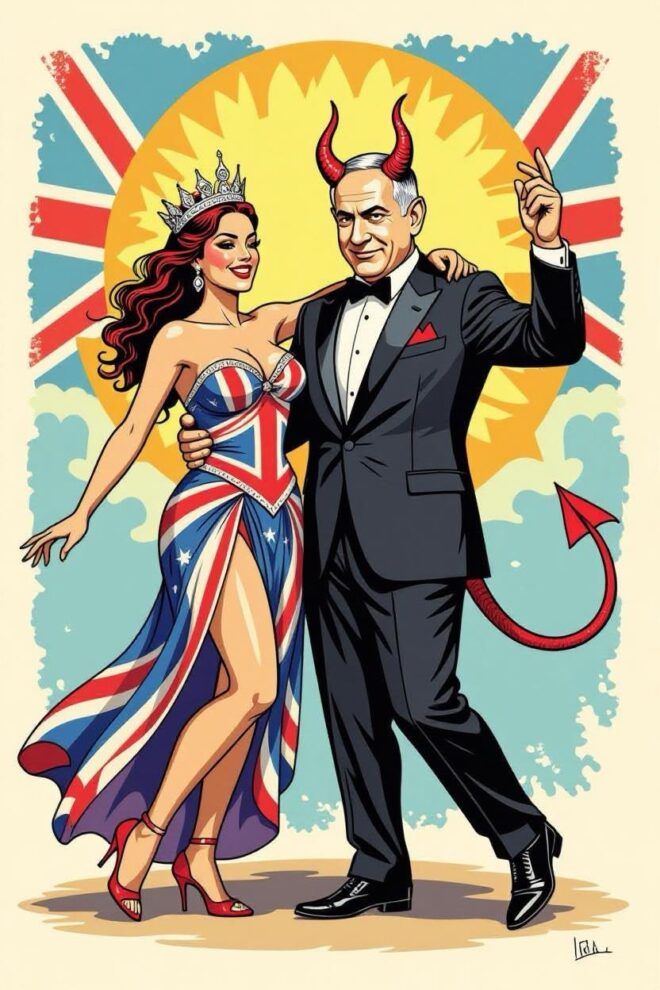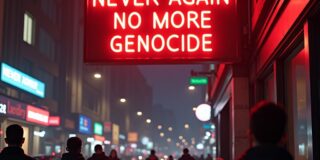
Whispered steps in fire –
Devil’s touch ignites the dark.
Ashes mark the dance.
Introduction
The tango is a dance of intricate entanglement, born in the shadowy underbelly of Buenos Aires, where passion meets peril in a rhythmic embrace. It requires two partners moving in sync, yet each step carries the risk of miscalculation, dominance, or betrayal. In the geopolitical arena, the West’s relationship with Zionism mirrors this dance, a seductive alliance forged in the fires of imperialism, ideology and self-interest, often at the devastating expense of Palestine and its people. This partnership, initiated in the late 19th century and solidified through the 20th, has perpetuated a cycle of dispossession, violence and erasure that continues to unfold today. The “devil” in this tango is not a supernatural force, but the moral compromises inherent in Western support for Zionism, which has enabled the systematic marginalisation of Palestinian narratives and rights.
Zionism, as a nationalist movement, emerged in Europe amid rising antisemitism, advocating for a Jewish homeland in historic Palestine. Yet, its realisation relied heavily on Western imperial powers, particularly Britain and later the United States, who viewed it as a strategic tool to extend influence in the Middle East. This support culminated in the 1948 Nakba – the catastrophic expulsion of over 700,000 Palestinians from their lands – marking the birth of Israel as a state and the onset of enduring conflict. The West’s complicity did not end there; it evolved into a pervasive institutional framework that suppresses dissenting voices on Palestine, framing criticism of Zionism as antisemitism or extremism.
In the wake of the October 7, 2023, events and the ensuing war in Gaza, this suppression intensified, revealing a cascade of institutional cowardice across arts, academia and media. From cancelled awards to censored articles and linguistic prohibitions, Western institutions have danced around the truth, avoiding direct confrontation with the human cost of their tango. This paper examines these dynamics, beginning with historical foundations, then delving into contemporary instances of erasure. By unpacking these events, it argues that the West’s alliance with Zionism perpetuates a devilish bargain: geopolitical dominance in exchange for the silencing of Palestinian suffering. Such gutlessness not only distorts history, but undermines the principles of free expression and justice that the West claims to uphold.
Historical Background: The Roots of the Entanglement
To understand the West’s tango with Zionism, one must trace its origins to the late 19th century, when Theodor Herzl, an Austro-Hungarian journalist, formalised the Zionist movement at the First Zionist Congress in Basel, Switzerland, in 1897. Herzl’s vision was a response to pervasive European antisemitism, including pogroms in Russia and the Dreyfus Affair in France, proposing a Jewish state as a refuge. However, Zionism was not merely a self-determination movement; it intersected with Western imperialism, which saw in it an opportunity to project power into the Ottoman-controlled Middle East.
Britain’s role was pivotal. The 1917 Balfour Declaration, issued by Foreign Secretary Arthur Balfour, pledged support for “the establishment in Palestine of a national home for the Jewish people,” while vaguely promising to safeguard the rights of “existing non-Jewish communities.” This declaration was no altruistic gesture; it aligned with British wartime strategies to weaken the Ottoman Empire and secure post-World War I dominance in the region. As historian Avi Shlaim notes, it reflected a colonial mindset that treated Palestine as terra nullius – a land without people for a people without land – ignoring the indigenous Arab population that constituted over 90% of inhabitants.
Western support intensified during the British Mandate (1920-1948), when Jewish immigration surged, facilitated by Zionist organisations and European powers. The United States, initially ambivalent, grew increasingly involved post-World War II, influenced by domestic Jewish lobbies, Christian Zionism and Cold War geopolitics. President Harry Truman’s recognition of Israel in 1948 was driven by electoral considerations and a desire to counter Soviet influence, setting the stage for enduring US aid – military, economic, and diplomatic – that totals billions annually.
The climax of this historical tango was the 1948 Nakba, Arabic for “catastrophe,” which saw the violent displacement of approximately 750,000 Palestinians – half the Arab population – from their homes during the Arab-Israeli War. This was not a spontaneous exodus, but a deliberate campaign of ethnic cleansing, as documented by Israeli historians like Benny Morris and Ilan Pappé. Zionist militias, such as the Haganah and Irgun, conducted operations like Plan Dalet, which involved the destruction of over 500 Palestinian villages, massacres (e.g., Deir Yassin, where over 100 civilians were killed), and forced expulsions. The war erupted after the UN Partition Plan of 1947, which allocated 56% of Mandate Palestine to a Jewish state despite Jews owning only 7% of the land and comprising 33% of the population.
The impact of the Nakba was profound and multifaceted. Economically, Palestinians lost vast agricultural lands, businesses and properties valued in billions today. Socially, it shattered communities, scattering refugees across Jordan, Lebanon, Syria and Gaza/West Bank, where many still live in camps designated by the UN. Culturally, it erased a rich heritage: villages razed, mosques and churches destroyed, and histories suppressed. The right of return, enshrined in UN Resolution 194, remains unfulfilled, fuelling intergenerational trauma and resistance.
Western complicity in the Nakba was evident in diplomatic manoeuvring. Britain withdrew without ensuring a smooth transition, while the US armed Zionist forces indirectly. This set a precedent for ongoing support: vetoes in the UN Security Council, arms sales, and framing Israel as a “beacon of democracy” amid Arab “backwardness.” Christian Zionism, rooted in evangelical interpretations of biblical prophecy, further bolstered US backing, viewing Jewish return to Palestine as a precursor to the Second Coming.
Critics argue that Zionism, while achieving Jewish self-determination, functioned as a settler-colonial project, akin to European expansions in Africa or the Americas. Herzl himself sought alliances with colonial powers, proposing Jewish settlement as a “rampart of Europe against Asia.” This entanglement has perpetuated inequality: Israel’s Law of Return grants citizenship to any Jew worldwide, while denying it to Palestinian refugees. The West’s tango thus dances on the ruins of Palestinian sovereignty, masking imperialism under the guise of humanitarianism.
Contemporary Instances of Institutional Gutlessness
The historical foundations of Western-Zionist alliance manifest today in a pervasive suppression of Palestinian voices, particularly intensified after October 2023. This “cascade of institutional gutlessness,” as observed in arts, academia and media, exemplifies how the tango priorities alignment with Zionism over truth and justice. These acts are not isolated but systemic, reflecting fears of backlash from pro-Israel lobbies and a broader reluctance to confront complicity in ongoing dispossession.
One of the earliest post-October indicators was the Frankfurt Book Fair’s decision in mid-October 2023 to cancel a ceremony honouring Palestinian author Adania Shibli with the LiBeraturpreis for her novel “Minor Detail”. The book, translated into English in 2020, is a haunting narrative divided into two parts: the first recounts a 1949 incident where Israeli soldiers raped and murdered a Bedouin Palestinian girl in the Negev desert, based on a true historical event uncovered in Israeli archives; the second follows a contemporary Palestinian woman’s quest to uncover this atrocity. Shibli’s work masterfully explores themes of memory, erasure and the banality of violence under occupation, drawing parallels between past and present Nakba.
Organisers, under Litprom, claimed the cancellation was a joint decision with Shibli and merely an “indefinite postponement” due to the “war in Israel.” However, Shibli denied any agreement, stating she was informed unilaterally amid a climate of mourning for Israeli victims while Palestinian suffering was sidelined. This sparked outrage: over 600 writers, including Nobel laureates, signed an open letter condemning the move as censorship and a failure to amplify marginalised voices. The incident highlighted how cultural institutions, fearing accusations of insensitivity or antisemitism, pre-emptively silence Palestinian perspectives, even when unrelated to current events. It set a tone for broader artistic repression, where empathy for Palestinians is deemed controversial.
This gutlessness extended to book clubs and literary spaces. In the months following October 2023, numerous US and European book clubs implemented policies prohibiting discussions on Palestine, citing the need to maintain “neutrality” or avoid conflict. For instance, PEN America documented cases where libraries and reading groups banned books on Palestinian history, such as those referencing the Nakba, under pressure from pro-Israel groups. In Watertown, Massachusetts, a children’s book on Palestine drew backlash, leading to event cancellations. These prohibitions reflect a “Palestine exception” to free speech, where discourse on Palestinian rights is curtailed to prevent discomfort or donor alienation. Such measures not only stifle education, but perpetuate ignorance, allowing Zionist narratives to dominate unchallenged.
Academia proved equally susceptible. In November 2023, the Harvard Law Review solicited, edited, and approved an article by Palestinian scholar Rabea Eghbariah titled “The Ongoing Nakba: Towards a Legal Framework for Palestine.” The piece argued for recognising the Nakba as an ongoing legal concept, encompassing genocide, apartheid and settler-colonialism in Palestine. Despite passing fact-checking, the board voted to pull it amid internal pressure, citing fears of backlash – no substantive flaws were raised. Eghbariah, a Harvard doctoral candidate, described this as unprecedented censorship.
When the Columbia Law Review agreed to publish an expanded version in June 2024, the board of directors – comprising alumni and faculty – demanded its removal post-publication, claiming procedural irregularities. Student editors refused, leading the board to shut down the entire website, an “unprecedented” act that drew condemnation from legal scholars. The site was restored only after student strikes, but the incident underscored how elite institutions prioritise Zionist sensitivities over academic freedom. Eghbariah’s work, proposing “Nakba” as a juridical category akin to “Holocaust,” challenged Western legal paradigms that exceptionalise Israeli actions. This suppression reveals a fear: acknowledging the Nakba as ongoing could implicate Western powers in complicity.
Media institutions followed suit. The 2024 Pulitzer Prize issued a special citation to “Journalists and Media Workers Covering the War in Gaza,” commending their bravery amid unprecedented dangers – over 100 Palestinian journalists killed since October 2023. Yet, it conspicuously avoided the naming individuals, opting for neutrality that erases identity. Critics, including Jeremy Scahill, argued this was a deliberate sidestep to avoid highlighting Palestinian agency and victimhood.
A leaked memo from The New York Times standards editor further exposed linguistic policing. It cautioned against using “Palestine” except in “very rare cases,” preferring “Palestinian territories” or avoiding it altogether. Terms like “genocide,” “ethnic cleansing,” and “refugee camps” were restricted, with instructions to frame Gaza as “densely populated” rather than occupied. This guidance, leaked to The Intercept, reflects a bias that humanises Israeli narratives while dehumanising Palestinians, aligning with Zionist framing. Such policies distort reporting, as seen in the Times’ controversial coverage of October 7 allegations, later scrutinised for reliance on unverified sources.
These examples illustrate a broader pattern: Western institutions, entangled in the Zionist tango, suppress discourse to maintain the status quo. From arts to academia and media, gutlessness stems from financial dependencies (e.g., donors), political pressures and internalised biases that equate Palestinian advocacy with extremism. This “Palestine exception” undermines democratic values, perpetuating erasure akin to the Nakba itself.
Broader Implications and Analysis
The suppression detailed above is not mere coincidence but a symptom of deeper structural issues in the West’s alliance with Zionism. This tango has evolved into a mechanism of epistemic violence, where Palestinian knowledge and experiences are delegitimised to sustain narratives of Israeli exceptionalism. In arts, the Frankfurt cancellation echoes historical censorship, such as the suppression of Palestinian literature during the Mandate era, reinforcing a cultural hegemony that privileges Zionist stories.
In academia, the Eghbariah saga exposes how universities, funded by pro-Israel philanthropists, self-censor to avoid controversy. This chills scholarship, particularly for Palestinian academics facing the “Palestine exception” to free speech. Broader trends include campus crackdowns on pro-Palestine protests, with suspensions and arrests rising post-2023. Such actions contradict Western ideals of open inquiry, revealing hypocrisy: while decrying authoritarianism elsewhere, institutions mimic it on Palestine.
Media’s role is particularly insidious, shaping public opinion through biased framing. The NYT memo and Pulitzer avoidance contribute to a discourse where Palestinian suffering is abstracted, reducing genocide allegations to “conflict.” This aligns with Orientalist tropes, portraying Arabs as irrational aggressors and Israelis as civilised defenders. The impact is global: suppressed narratives hinder policy shifts, perpetuating US vetoes of UN resolutions on Gaza.
Politically incorrect as it may seem, this suppression borders on complicity in ongoing atrocities, as Western silence enables Israel’s actions. Substantiated by UN reports on Gaza’s destruction, it demands reckoning: the tango’s devil exacts a human toll, eroding moral authority.
Conclusion
The West’s tango with Zionism, from Balfour to modern censorship, has danced over Palestinian rights, fostering erasure and injustice. By confronting these instances of gutlessness, society can step toward equity. Ending the dance requires amplifying suppressed voices, challenging biases, and pursuing genuine peace. Only then can the devil be exorcised.


